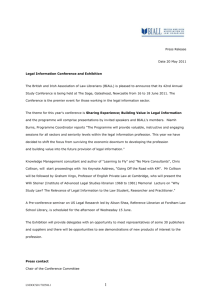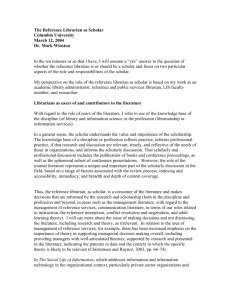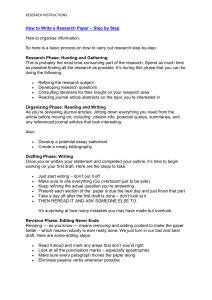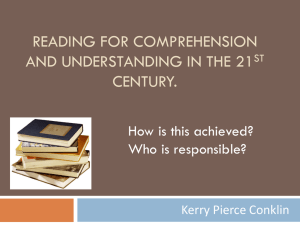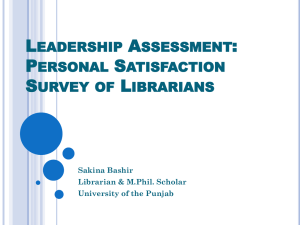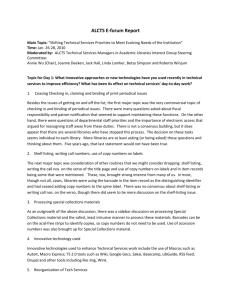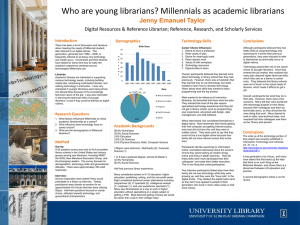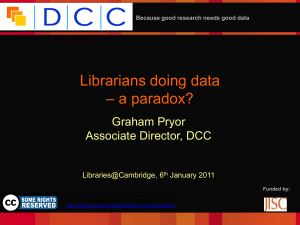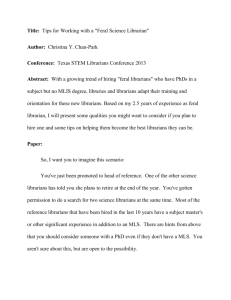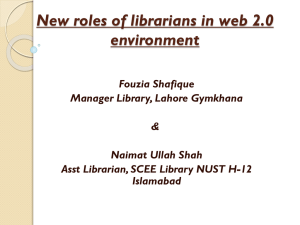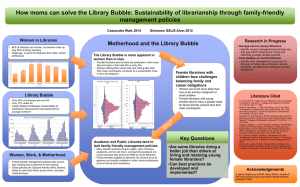The Librarian as a Professional in the Modern
advertisement
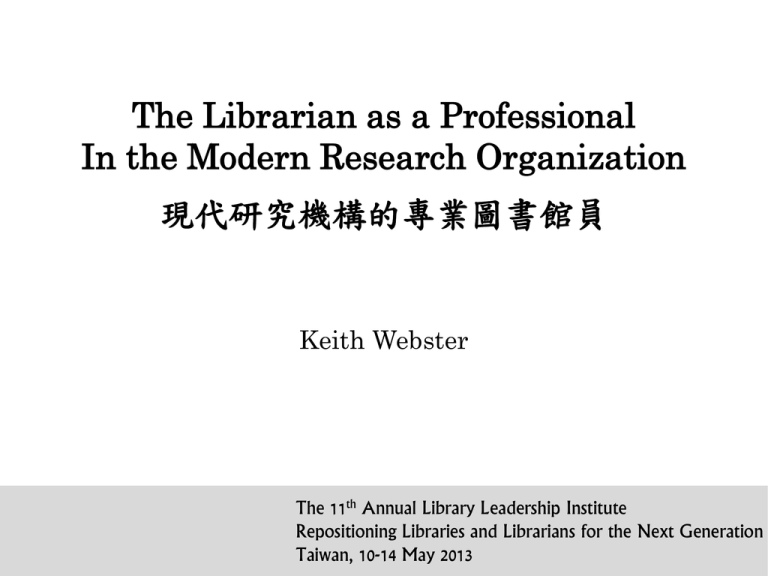
The Librarian as a Professional In the Modern Research Organization 現代研究機構的專業圖書館員 Keith Webster The 11th Annual Library Leadership Institute Repositioning Libraries and Librarians for the Next Generation Taiwan, 10-14 May 2013 Key ideas • • • • • The notion that libraries should be passive providers of information is redundant The information landscape is becoming complex Librarians can be and should be active parts of their clients’ research communities We should not sit in libraries waiting for things to happen There is much in academic life to which we can contribute Shifts in knowledge production • • • Mode 1 and Mode 2 “Traditional science” and reflexive research Triple helix of overlapping interests (university, government and industry) Funding structures and requirements 1 • • • • • • • External funding Diverse source of funding • • • Government Not-for-profit Industry Economic outcomes • • increase wealth creation & prosperity improve nation’s health, environment & quality of life Innovation Improved competitiveness “Commercialisation” of research Less “curiosity-driven” activity Funding structures and requirements 2 • • • Evaluation, evaluation, evaluation… • • cost-effectiveness or “value for money” economic and social relevance Requirements of research assessment • • increased quantity of published outputs increased “quality” of outputs Compliance requirements • • published outputs in open access storage and re-use of data sets Macro-level view of changes • • • Research in academic and public sectors almost exclusively tied to external funding External funding allocated on basis of excellence, collaboration and multi-disciplinary approaches Growing emphasis by funders on public engagement and on ‘open’ everything Likely consequences • • • Concentration of research amongst top players Research institutions need to - demonstrate excellence be efficient at other stuff (teaching) Non-research institutions need to - be better at teaching to survive diversify (CPD, community engagement) Research funders • • • • Fund the best research to meet the needs of the country Develop leaders and researchers who can meet national and global priorities Foster public engagement with research Funding international collaboration • eg EPRSC £48m to US/China/India Proportion of global publication authorship by country 1993-2003 2004-2008 Linear extrapolation of future publication trends Research funders • • • Greater emphasis on multi-disciplinary, collaborative, international, large-scale research Primary funders of research able to enforce compliance with their policies - eg OA/TDM Opportunities for potential partnerships - eg around repositories and data management, and promoting OA journals Changes in researcher behaviour • • • Expecting instant access to pre-screened and highly relevant literature Expect everything - content, services, tools - to be free or paid for centrally Increasingly unaware of journal brands (and certainly very little/no awareness of publisher brand) Newer researchers • • • • Tend to work at the article rather than journal level They discover new content through alerts from multipurpose databases Exploring ways of using social networking to share findings and news Interest in digital science tools - but concerns about influencing senior colleagues, and infrastructure support Implications for libraries • • • • • • • Institutional focus on research may reduce funding to support teaching Pressure on researchers may require libraries to become more student focussed Emphasis on e-learning Greater demand for research collections Focus on collections for immediate use rather than “just-in-case” Institutional infrastructure - repositories, digital science In-house research evaluation support Collaborative Finding Structured Finding Keeping Current Serendipitous Finding Discover Collecting Publishing Share Teaching Gather Acquiring Data Sharing Organizing Create Rights Writing Annotating Reviewing & Rating Analyzing Describing Learning about Grant Funding Opportunities Managing Intellectual Property and Exploiting Commercial Value Finding Potential Collaborators and Making Themselves Visible to Others Management and Storage of Documents and Data Sets Improving Information Retrieval and Management Skills Managing Literature Citations Choosing Where to Publish or Alternative Forms of Dissemination Support for Promotion and Tenure Professional Standing Managing Pre-prints, Publications, and Post-prints What is happening in the world is bypassing university libraries Peter Murray-Rust The scientist’s view JISC Libraries of the future debate, April 2009 Major drivers of change Cross-roads of the Global market information for higher industry, with varied education, new models publishing and emerging information services Rapidly changing needs of researchers Increasing integration/ blurring between higher education and ‘business’ Net gen /Generation Y Advances in technology Our Professional Future •Access to information, ideas and works of imagination is an essential characteristic of thriving democracies, cultures and economies. This is increasingly so in the global information society. Information is a cultural, social and economic resource and a commodity of crucial importance in a huge range of diverse enterprises. Librarians and information scientists can be at the heart of this revolution, in demand for their creative, technical and managerial expertise. •Library Association/Institute of Information Scientists, 1999 •“…contact with librarians and information professionals is rare” “…researchers are generally confident in their [self-taught] abilities.., librarians see them as..relatively unsophisticated” “…librarians see it as a problem that they are not reaching all researchers with formal training, whereas most researchers don’t think they need it” • • • • • • The part that academic librarians should play remains unclear Raise awareness of research, its management and evaluation amongst library staff Provide advice on data management and research evaluation to researchers Data curation is vast, complex and requires subject input Library anxiety •“The image of librarians in popular culture discourages a user from approaching a librarian” •Nilsen and McKechnie, 2002 • “The bad news is that I’m not sure they understand what goes on in the library other than taking out books.” • Benton Foundation, 1996 • “User perceptions negatively affect the ability of librarians to meet information needs simply because a profession cannot serve those who do not understand its purpose and expertise.” • Durrance, 1988 • “Study after study shows that people who need information are not likely to think of asking a librarian.” • Durrance, 1990 • “The key issue facing the profession is invisibility.” • IFLA, 1995 The worst thing about the stereotype is that it impacts on the psyche of librarians who really begin to believe that they don't deserve the kingpin role US Congress, 2001 Libraries or Librarians? • • • We promote the Library Visit the Library to X, Y or Z Satisfy your information needs at the Library • • Rather than: Consult the Librarian to A, B or C Your Librarian is a highly-trained professional • • Our view of the profession itself, and of our skills, should not be limited to a building with four walls Come back to our core knowledge • • • Librarianship is a profession of searching, discovery and analysis Too often we are viewed as keepers and protectors, as curators and gatekeepers We are a profession educated to solve information problems CILIP BODY OF KNOWLEDGE CORE SCHEMA Resources and tools • • • • • • • • • • Collection development: Specialist books Know what is good scientific practice in each field How to search, find and critique the literature old and new Help with literature searches and bibliographies Help with updating services eg RSS feeds etc How to use search tools Know about publication changes in online and print Knowledgeable about technology Provides online tutorials on every aspect of thesis production User education and ‘how to manage consumption rather than content’ Disciplines • • • • • • • Know the disciplines Know what is good scientific practice in each field Know the research methodologies in competing paradigms of a discipline Be able to refer to the best theoretical underpinnings in subjects Know who’s who in the subject fields Know the key journals in the disciplines Knowledge of impact factors eg h index and JCR Research • General • • • Research ethics and plagiarism; copyright Aware of social and cultural values the researcher must respect Research savvy • Guidance • • • Have model PhD theses for each subject Know about thesis structure Have models of literature reviews in every subject Research • Process • • • • • • Help students relate the theory to their study How to write a good introduction and conclusion Know about academic writing and needed writing skills How to prepare a bibliography Referencing techniques Data management practices • Publication • • Understand order of authorship for publication Know where to publish and how to choose journals Others • Understands teaching and learning – theory, methods, paradigms, styles • Knowledge of digital rights and intellectual property • Effectively markets him/herself and the library and its services • Supports open access • Actively involved in institutional repositories; find ways of ‘harvesting eresources‘ • Forward thinking about acquisitions and collection development • Support collaboration; sharing and promoting access to resources – • promoting access and curation in the new information age – knowledge management • Explore new ways of servicing an increasingly remote user population Evelyn: Look, I... I may not be an explorer, or an adventurer, or a treasure-seeker, or a gunfighter, Mr. O'Connell, but I am proud of what I am. Rick: And what is that? Evelyn: I... am a librarian. It is 2015 • The library profession in your country is upbeat and vibrant and entry to the field is highly sought after by graduates. • The librarians who retired during the past five years have been replaced by talented successors. • What have you done to achieve this? • What has your Library done to achieve this?
